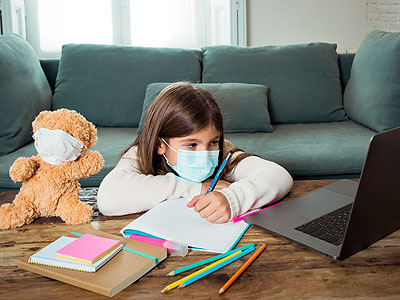-
How to Help a Child Who’s Showing Signs of Loneliness and Isolation
- Posted on March 24, 2021
- by admin
- in All Articles, NFSB Blog
- Comments Off on How to Help a Child Who’s Showing Signs of Loneliness and Isolation
 While the pandemic has forced all of us into isolation to some degree, children in particular have been struggling from the lack of interactions. In fact, COVID-19 has created an additional layer of isolation that has made the problem worse.
While the pandemic has forced all of us into isolation to some degree, children in particular have been struggling from the lack of interactions. In fact, COVID-19 has created an additional layer of isolation that has made the problem worse.“Family isolation is something we had rarely seen in kids until the pandemic,” said Jessica Hauck, LAC, ATR-P, a mental health counselor at Nutley Family Service Bureau (NFSB). “Even if kids were struggling socially at school or with extracurricular activities, they could still see family whenever they wanted. The pandemic has taken away or at least limited those interactions.”
A major family change is a common cause of isolation and loneliness in children. This change could be the result of a divorce, a new baby, a move to a new home, or the death of a close family member. Changes in school, such as a move to a new classroom, create opportunities to make new friends but can also increase loneliness.
Signs of Isolation in Children
Most children won’t come right out and say they feel lonely. Feelings of isolation typically become visible through changes in the child’s behavior.For example, the child:
- Seems angry all the time for no particular reason.
- Cries frequently or has mood swings.
- Has trouble sleeping or suddenly wants to sleep with parents.
- Loses their appetite.
- Becomes uncooperative or stops following rules.
- Struggles academically after a history of good grades.
How to Help a Child Who Feels Isolated or Lonely
Start by being more intentional about spending time with your child and doing activities they enjoy. It can be easy to fall into a routine in which the entire family is in the same room but everyone is doing something different. If you’re not doing things together, a child can still feel isolated. Focus on finding activities the child enjoys and doing them together.Be honest as a parent or caregiver about how you’re feeling and show your child that they’re not alone. You might say, “I’ve been lonely because I can’t see my friends. Do you ever feel that way?”
Some parents of teens and adolescents use phones and tablets as bargaining chips. Unfortunately, punishing a child who feels isolated by taking away technology can make them even lonelier, especially during the pandemic.
One alternative is to use technology as a reward. For example, if a child follows the rules and behaves properly, they could be rewarded with an hour of uninterrupted screen time.
Ideally, technology and material rewards would be completely removed from the equation. Instead, reward children with special activities they enjoy, whether that means taking a cooking or painting class together, visiting friends safely, or spending the day somewhere special, like the beach or the mountains.
An NFSB Success Story
We had been seeing a family for quite some time with an adolescent girl who we’ll call Kelly. Kelly suddenly showed signs of struggling at school. She had been a very good student, but her grades began to drop and she was having behavioral issues. At home, she wouldn’t help with household chores and refused to go to bed at night.These problems were attributed to isolation Kelly was feeling after her family moved. Between moving to a new area and COVID-19, she was lonely and lacked support.
We took steps to get Kelly additional academic support. Her mother made an intentional effort to create opportunities to make new friends while also staying connected with friends from Kelly’s old school and neighborhood. Kelly’s mother also spoke openly about her own feelings of isolation. These efforts have led to improvements in Kelly’s behavior and socialization.
Keep in mind that it’s never too early to help a child or seek professional help. The longer you wait, the worse the situation can become, and the longer it will take to fully address. If an isolation-related issue isn’t improving or gets worse, contact us at 973-667-1184 to schedule an appointment.
If you enjoyed this article please consider sharing it!
Archives
- April 2024
- March 2024
- February 2024
- January 2024
- December 2023
- November 2023
- September 2023
- August 2023
- July 2023
- June 2023
- May 2023
- April 2023
- March 2023
- February 2023
- January 2023
- December 2022
- November 2022
- October 2022
- September 2022
- August 2022
- July 2022
- June 2022
- May 2022
- April 2022
- March 2022
- February 2022
- January 2022
- December 2021
- November 2021
- October 2021
- September 2021
- August 2021
- July 2021
- June 2021
- May 2021
- April 2021
- March 2021
- January 2021
- December 2020
- November 2020
- October 2020
- September 2020
- August 2020
- July 2020
- June 2020
- May 2020
- March 2020
- January 2020
- November 2019
















